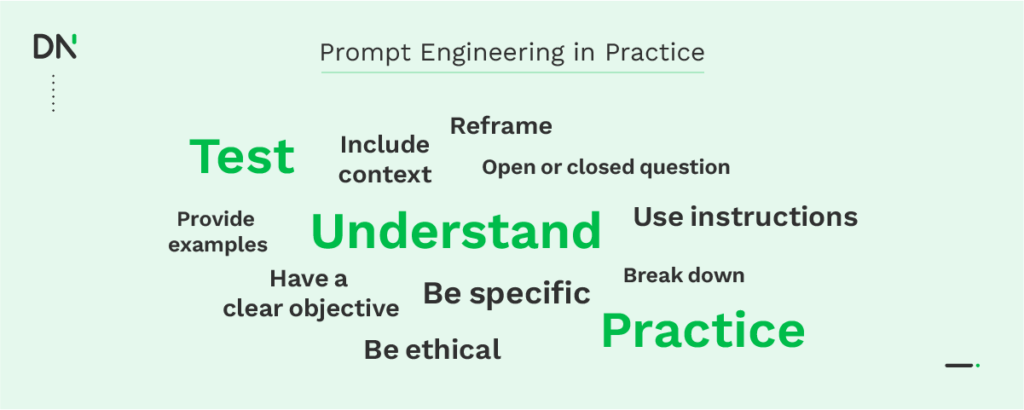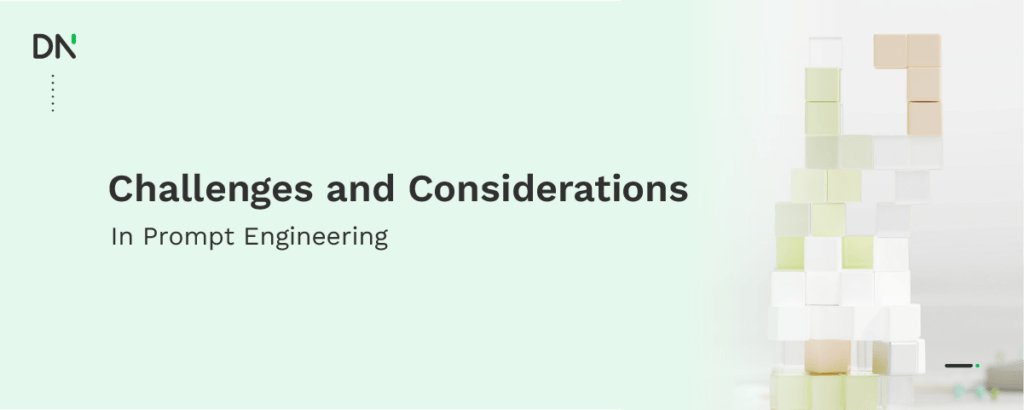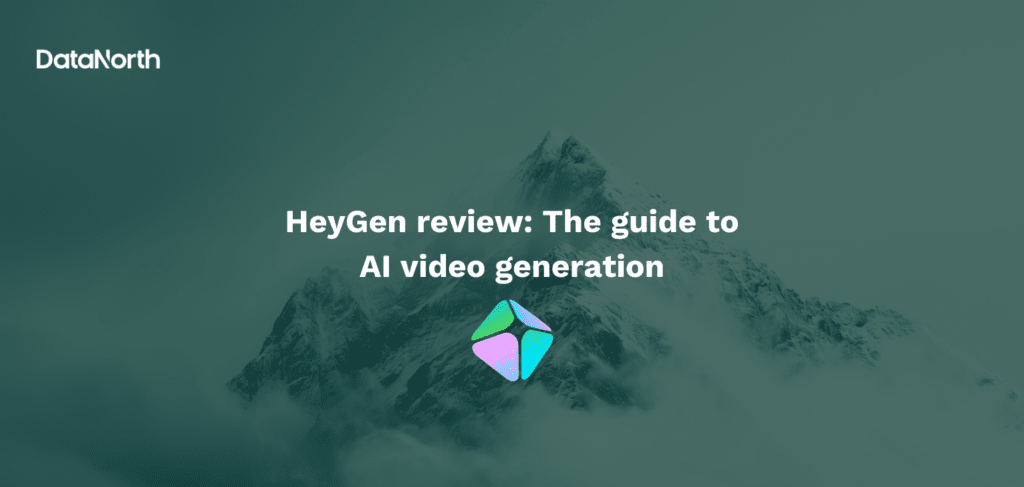There’s a growing trend towards adoption and popularity of generative AI solutions like ChatGPT. As a result there’s a new job coming up: the prompt engineer. The prompt engineer is an expert who gets the best results from generative AI tools. A lot of organizations can profit from hiring a prompt engineer. That’s the reason why not only software companies but also digital advertising agencies and healthcare providers are advertising for the job.
So what is prompt engineering? And why is it important for organizations? This blog will provide you with the answers!
What is Prompt Engineering?
At its core, prompt engineering is the art of crafting inputs that guide Artificial Intelligence systems to produce desired outputs. The input of an AI system is called a ‘prompt’, so basically prompt engineering means creating the best input to get your desired output back. A prompt can range from a simple question to a complex instruction, depending on the task and the AI system.
An Example of the Importance of Good Input
Imagine this, your coworker asks you to write an email, but he doesn’t give you proper instructions about what to write. In that case you have to guess and your created output may not be what he had in mind. Would he give you a clear and comprehensive instruction, then you’re able to write exactly what your coworker wants.
A Generative AI tool works the same way. You give unclear instructions, you’ll most likely get an undesired response. Give it a well thought out prompt engineered input, you’ll get the result you’re looking for.
Understanding AI Models and Goals
The process of prompt engineering involves understanding the capabilities and limitations of the AI model, the model’s context, and the goals of the interaction. The quality of the prompt directly affects the quality of the response. Whether you use AI for generating texts, creating images, or solving complex problems, prompt engineering is an important skill in effectively using AI.
In fact, organizations seeking to leverage these capabilities can greatly benefit from AI assessments to understand their current AI maturity and how prompt engineering can be integrated into their processes.
Prompt Engineering in Generative AI (GenAI)
Prompt engineering is mainly applied to Generative AI systems. Generative AI includes technologies that can produce content like text, images, and music. GenAI relies heavily on well-crafted prompts. In this case the prompt serves as a starting point or instruction which shapes the direction and boundaries of the output.
A well-engineered prompt ensures that the AI understands the task, which leads to outputs that are more aligned with the expectations. For example, for tools like ChatGPT and Microsoft Copilot prompt engineering determines how effectively the AI can answer questions, give insights and engage in conversations. Additionally for visual AI platforms like Midjourney, a high quality prompt directly affects the relevance, creativity, and accuracy of the generated images.
The Evolution of Prompt Engineering
As AI systems have become more integral to business operations, prompt engineering has grown from a niche practice to a recognized discipline. A couple of years ago, in the early days of AI, AI models were very limited and prescripted. But in recent years the models have become more sophisticated and the ability to guide the models with prompts has unlocked new creative possibilities.
The evolution of AI models reflects a deeper understanding of how the models process and generate responses. This understanding leads to more effective prompting strategies. The emergence of GenAI platforms like ChatGPT is not only indicating the popularity of AI interactions among the general public. It also shows the vital role of prompt engineering in defining the quality and relevance of AI interactions.
In recent years there have been a lot of developments in the AI world. Prompt engineering has evolved a lot over the past few years. But it is evident that it will be vital for AI models for years to come.
Prompt Engineering in Practice
Crafting effective prompts is both an art and a science. It begins with a clear understanding of the desired outcome and a deep knowledge of the AI’s capabilities. An effective prompt should be clear, concise, and specific, avoiding ambiguity that could misinform the AI.
Refining prompts often involves an iterative process, where initial outputs are analyzed and the prompt is adjusted to better guide the AI. This might involve adding more context that specifies the desired format of the response or clarifies the task.

If you’re new to prompt engineering, here are some tips to get you started:
- Understand the AI model: Know what the AI model you’re using can and cannot do.
- For example, ChatGPT is limited to data up until April 2023, so provided information could be outdated.
- Start with a clear objective: Know what you want the AI to do
- Be clear and specific: Vague prompts lead to unpredictable results.
- Include all necessary context: Help the AI understand the broader picture and don’t assume the model knows the context of your question.
- Break down your prompt: If you have a complex question, consider breaking your prompt down into smaller, incremental steps. This approach will effectively guide the AI to the desired outcome.
- Closed vs open questions: Use closed questions if you need concise information. Use open questions you are looking for explanation, opinions, or creative output.
- Reframe your questions: If you don’t get the answer you wanted, try to reframe your question. A slight change in wording or perspective might lead to significantly different results.
- Use instructions or examples: By including instructions or examples in your prompts the model knows what you’re looking for.
- You could for example start your prompt with: ‘Write a brief summary of…’ or ‘Explain AI like I’m six…’
- Be mindful of ethics: Avoid prompts that could lead to generating harmful, biased, or sensitive content.
- Test and Iterate: Test different prompts to see which one yields the best results and use the AI’s responses to refine your prompts.
- Practice your prompts: Practice makes perfect. You can practice with the following exercises:
- Craft a prompt asking for a summary of a complex topic and specify the desired length and perspective.
- For example, you could ask to ‘provide a one-paragraph summary about giving AI workshops for a business audience.’
- Create a series of prompts that lead the AI through a multistep problem. You could, for example, ask it to plan a small event or solve a math problem.
- Write a prompt asking the AI to generate a short story and specify the setting, character, and plot twist.
- For example you could start with your prompt like: ‘Imagine a vibrant, futuristic city. In this setting the main character, Chris, is providing organizations with inspirational AI demo’s…’
- Craft a prompt asking for a summary of a complex topic and specify the desired length and perspective.
As you probably have noticed, prompt engineering is both an art and a science. It requires practice and experimentation in order to master it. The more you work with the AI and experiment with different types of prompts, the better you’ll become at obtaining the responses/output you need.
The field of prompt engineering is evolving and as a result the role of the prompt engineer is becoming more important. Organizations are starting to recognize the importance of high-quality input to get desired AI outputs. The prompt engineer is the one for the job. But what is a prompt engineer? Let’s find out.
The Role of a Prompt Engineer
A prompt engineer is a specialist who combines knowledge about AI with communication skills. The goal is to craft effective prompts that guide AI systems to the desired outcomes. The role of the prompt engineer is becoming increasingly important in organizations that use AI.
The following skills are essential for a Prompt Engineer:
- Deep understanding of AI and Machine Learning (ML) models
- Strong communication and writing skills
- Ability to analyze and interpret AI outputs
- Creativity in problem-solving
Major tech companies and innovative startups are starting to realize that prompt engineers are important. Not only AI companies like Anthropic are hiring prompt engineers, also big non-tech companies like Nestle Purina are starting to integrate prompt engineers into their existing AI teams. But all companies have the same goal: to enhance the effectiveness of AI applications.
Challenges and Considerations in Prompt Engineering

The art of prompt engineering has its challenges. The open-ended nature of Generative AI means that prompts can sometimes lead to unexpected or undesirable outputs. The challenges include:
- Ambiguity and Misinterpretation: AI could potentially misinterpret prompts due to complexities and subtleties of human language.
- Model Limitation: AI models are shaped by their training data and architecture, which define the boundaries of their capabilities and inherently constrain the model.
- Prompt Bias: The language and structure of the prompts could contain unintended bias, which potentially alters the output.
- Overfitting Prompts: There is a risk of creating prompts that are overly specific. This could reduce the AI’s flexibility and applicability across various contexts.
Ethics
Besides the challenges, there are also some ethical considerations that come into play. Especially prompts that could guide the AI towards biased, incorrect, or harmful responses.
Some ethical considerations:
- Bias and Fairness: To ensure fairness and inclusivity, the prompt engineer should overcome challenges like avoiding and mitigating biases in AI outputs.
- Transparency and Accountability: AI systems should contain clear and accountable decision-making processes. These processes are influenced by the design of the prompts.
- Privacy and Security: Prompt engineers should ensure that AI interactions respect user privacy and data security, especially if they use sensitive data.
- Content Control: Content should be checked to prevent AI from generating harmful, offensive, or inappropriate information.
Practical Matters
It’s really important to take the ethical considerations into account. But besides the ethical considerations, there are also some practical matters prompt engineers should consider:
- Scalability: As AI applications grow, it’s important to adapt prompt engineering to the scale in order to maintain quality and consistency.
- User Experience: To meet user expectations prompts should be designed to lead to intuitive and satisfying AI interactions.
- Iterative Testing and Refinement: Improving prompts involves an ongoing process of testing, gathering feedback, and refining prompts.
Align AI with User Intention
To ensure the AI’s output remains aligned with user intention and societal norms, prompt engineers employ some strategies like:
- Diverse Training Data: Using broad and representative datasets for training AI models, will reduce the bias and improve response robustness.
- User Testing: Testing the AI responses to prompts with a wide variety of users, provides a lot of feedback to improve prompts.
- Ethical Guidelines: It’s important to establish and follow ethical guidelines for prompt engineering. It not only focuses on critical areas like fairness, privacy, and harm prevention, but it also promotes responsible AI usage.
- Cross-Disciplinary Collaboration: Collaborating with experts from various fields like linguistics, psychology, ethics, and other disciplines enhances the quality and effectiveness of the prompts.
The Future of Prompt Engineering
As AI continues to advance, the field of prompt engineering is expected to grow with it. Future developments may include:
- More intuitive interfaces for crafting prompts
- Greater insights into how models interpret and act on prompts
- Advanced tools for testing and refining prompts
These developments will lead to an increase in sophistication and importance for prompt engineering.
As AI evolves, the role of prompts engineering will probably expand with it. This will make prompt engineering an essential skill for every organization that wants to leverage AI technologies. AI will become more embedded in our daily lives and work. So people that have the ability to effectively communicate with AI systems are critical in shaping the future of human-AI interactions.
Get Started with Prompt Engineering
This blog provided you with a few tips about creating the best prompts yourself. Additionally, the blog explained what it means to hire a prompt engineer. But starting with prompt engineering could be hard and finding the best prompt engineer could be even harder. So if you need any help in this process, DataNorth comes to your rescue!
In our AI Training & Workshop we teach about AI and how to utilize it in your organization. We can help you with all your questions related to AI, ChatGPT, machine learning, and even prompt engineering. So if you want to leverage the power of AI, contact us here!





